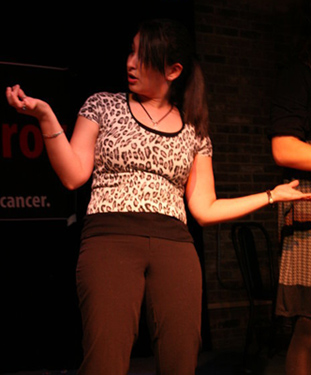"Tragedy is when I cut my finger. Comedy is when you fall into an open sewer and die." - Mel Brooks
Having loved the concept of "making it up on the spot" from watching reruns of Whose Line Is It Anyway? as a kid way past my bedtime, I knew improv comedy was something I wanted to try. Once I got to college at UF, I decided to go to the first meeting of the semester of Theatre Strike Force, the college's "premiere" improv and sketch comedy troupe. A year and a half later, I can now proudly say that I'm a seasoned performer and member of the executive board of an organization that I only dreamed existed somewhere for me in that haze of collegiate involvement thrust upon every freshman at Preview.

|
It's refreshing to have no idea what's going to happen next. While that tends to turn people away from the craft, I think it's what makes it easier than acting from a script. Because it's improvised, there's an inherent lower expectation. When you blow them away, it's a bigger bang for your buck. On the flip side, however, I'll be the first to admit that improvising entire scenes is tough -- there's endless things to take into consideration while still trying to remain open to anything. It's a tightrope of possibilities that you have to be willing to fall off the edge for.
There's actually two main kinds of improv: short form versus long form. In a nutshell, short form is the game-based improv you'd likely see at a dorm show or Gator Nights performance, very similar to Whose Line? or Wild 'N Out games, such as Party Quirks, Sound FX and The Dating Game. It's quick, fun and loud. Long form, on the other hand, is similar to an improvised play. The most popular (and probably most highly regarded long form) is called a Harold, but there are tons and tons of forms, many of which just get made up by performers who want to try something new. They all do require a high attention to detail as most of the funniest things about long form come from a performer's ability to remember a small detail from earlier in the form and call it back later. Audiences eat that up.
What many people don't realize is how much improv has influenced other facets of comedy. Saturday Night Live? Most of the casts have been made up of former improvisers. An episode of Seinfeld? Written to mimic the format of a Harold (each character has a seperate storyline and, by the end of the episode, they all mesh together).
But how does this relate to "real life?" Does the adult world have any place for funny make-'em-ups? Improv comedy has a ton of traits that potential employers would simply gush over: teamwork, quick problem solving, being comfortable with public speaking, charisma and great communication skills. Just because something is fun, doesn't mean it's not useful.
If you're interested in learning more about improv, check out TSF! We even have a new site that I maintain dedicated to posting videos of improv and sketch that we've done.
I also recommend reading Truth In Comedy by Del Close and Charna Halpern, two of the most famous and renowned improv teachers in the world.
Bill Arnett, a TSF alumni and current head instructor at the iO Theatre, also has an improv blog that has proven helpful to improvisers for years.
